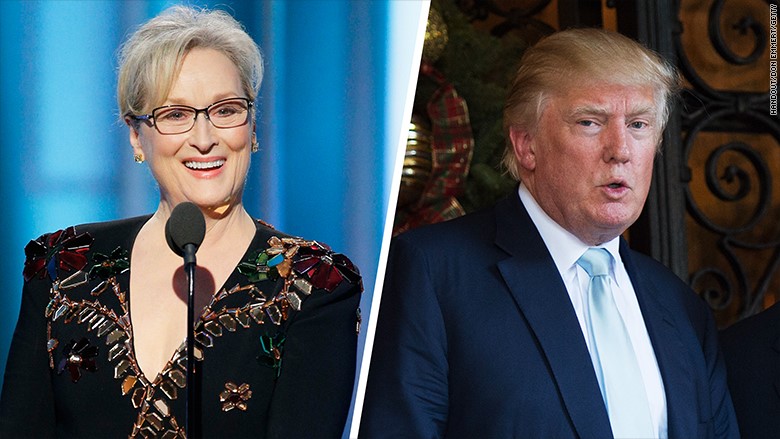 Since Sunday’s Golden Globes Awards ceremony in California, most of us will have heard talk of actress Meryl Streep’s speech, made as she accepted the award for “outstanding contributions to the world of entertainment”, in so far as this was less-than-subtly directed towards US President-elect Donald J. Trump.
Since Sunday’s Golden Globes Awards ceremony in California, most of us will have heard talk of actress Meryl Streep’s speech, made as she accepted the award for “outstanding contributions to the world of entertainment”, in so far as this was less-than-subtly directed towards US President-elect Donald J. Trump.
In what has become true Trumpian style, Donald J. took to Twitter to respond, criticising Streep. But is this public exchange of negativity fair play, or could the leading actress and the soon-to-be leader of the Western world be falling foul of the law?
The contenders:
Streep did not name names, but referenced the “person asking to sit in the most respected seat” in America, and the shocking moment when, in the run up to his election, he appeared to “imitate” a disabled newspaper journalist: someone, Streep said, he “outranked in privilege, power and the capacity to fight back.” She went on to reference an “instinct to humiliate”, “disrespect” and “bullying” on the part of that powerful party.
In response, Trump tweeted that Streep was “one of the most over-rated actresses in Hollywood.” He went on to call her a “Hillary flunky who lost big”, to deny mocking a disabled reporter, and to proclaim: “Just more very dishonest media!”
The stakes:
In Scotland, any attempt to sue for offence caused to either Trump or Streep would be governed by our civil law of defamation. The terms “libel” and “slander” may be more familiar: libel is written defamation while slander is spoken defamation, but in Scotland both are under the same legal umbrella.
Is Streep “defaming” Trump, then, in making negative comments so clearly intended to refer to him? And is Trump defaming her in responding with slurs on Twitter?
Who can win?
The first step is whether what is said is “defamatory”? The test is whether what has been said - taken in the context of Streep’s speech as a whole, and Trump’s stream of Twitter consciousness on the matter as a whole - can be said to lower estimations of the person it is said about. This is tested according to what a right (read: correct/reasonable, not Republican)-thinking member of the public would think, and must be proven on the balance of probabilities. If what is said is defamatory, a Scottish court will presume both that the statement is untrue, and that it was made maliciously, and a basis for a compensation claim for reputational harm will be formed.
Turning first to Streep’s comments on Trump, it is reasonable to assume that being believed to have imitated a disabled person will lower public opinion of you, especially as in the context of references to “humiliation” and “bullying” the clear inference is that the disabled person was harshly mocked.
Trump, on the other hand, would be hard-pressed to argue that being “the most over-rated” is anywhere near a selling-point, and was therefore undeniably insulting Streep.
But hold on...everyone’s a winner?
Thankfully for both Trump and Streep (should either of them in fact have been eager for a Scottish law suit), Scots law provides for a number of defences to stop a defamation claim in its tracks.
- (and in Trump’s corner) is “fair comment”. This applies where what is said is simply a value judgment on a matter of public interest. Streep’s acting is a matter of public interest, so Trump is in with a shot here, but a court would consider whether there was a factual basis for his view, and whether an honest person could express such a view based on the facts… clearly, those on the Golden Globes judging panel would beg to differ!
- (and potentially in Streep’s) is Veritas. In short, it ain’t defamation if it’s true, though in defending a claim from Trump, the onus is on Streep to prove that truth. Therefore, despite Trump being at pains to tweet that he did not “mock”, might the actors who applauded Streep at her winner’s podium, and the many others who have supported her since, having seen footage of the incident she referred to, say that any defamation claim by Trump should fail, for the simple reason that all she said was…true?
Jennifer Gilmour


